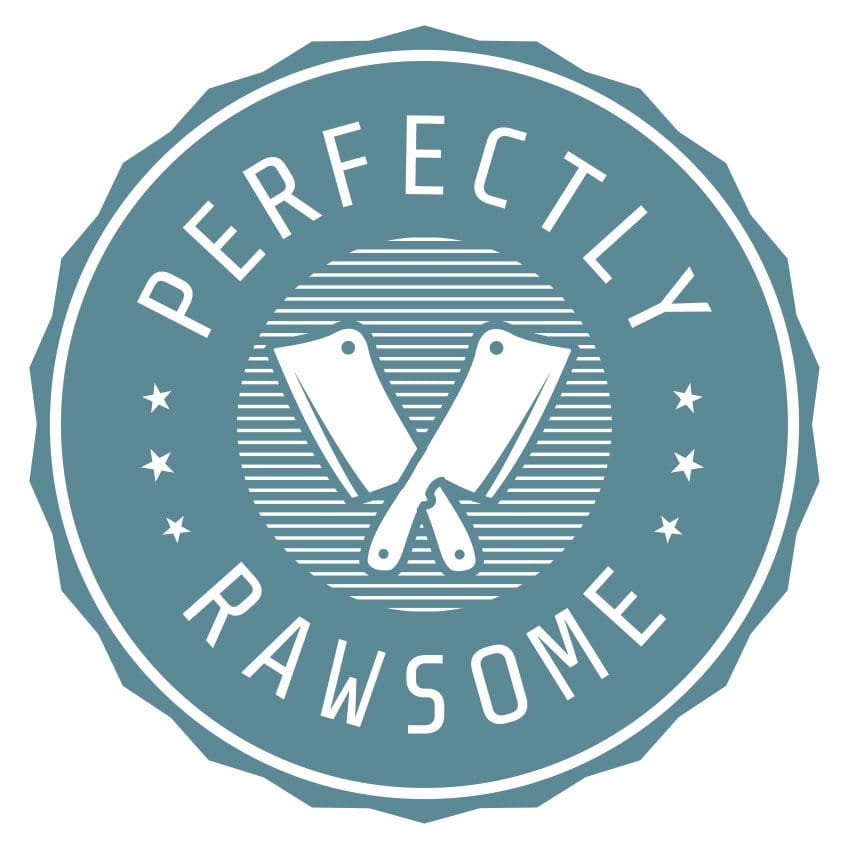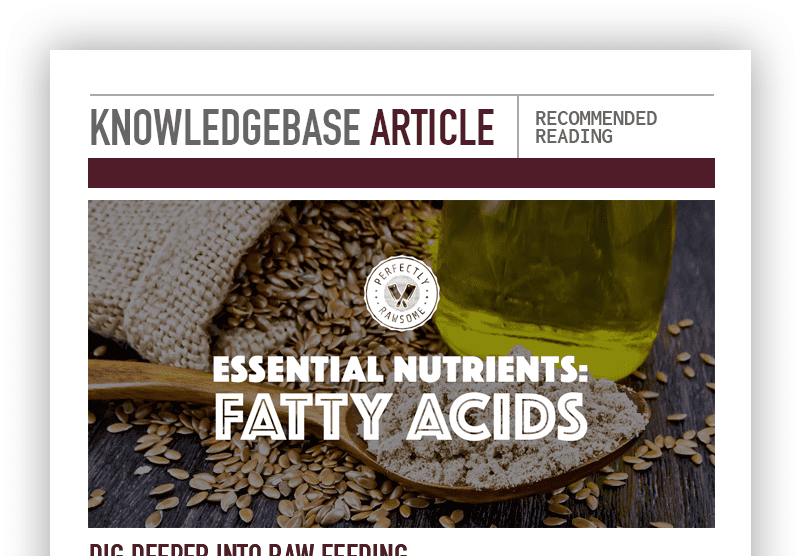Many pet owners assume that adding a multivitamin supplement to their pet’s raw diet will make up for any potential deficiencies; however, this is not the best choice. Multivitamins will often provide nutrients already present in raw diets, while missing the common deficiencies.
Instead it is recommended to identify the specific nutritional gaps and fill them with either whole foods or a high-quality, individual nutrient supplement(s).
There are many ways to feed a balanced homemade raw diet. While whole foods are considered ideal to meet all essential nutrients in a homemade raw diet, there are several scenarios where supplements may be necessary.
Depending on the individual situation, there may be circumstances where certain whole foods are inaccessible, too expensive, or inappropriate for the individual animal. There are several key areas where supplements may be necessary:
Raw Meaty Bone Alternatives
While whole bones provide the dental benefits of chewing, there are instances where bone alternatives are necessary for essential minerals.
Essential Fatty Acids
Various fatty acids are important for nutritional balance. Supplemental oils may be necessary when whole foods can’t be used.
Minerals
Certain minerals are commonly deficient in homemade raw diets. While these minerals can be provided through whole foods, a supplement is necessary when these foods cannot be used or sourced.
Vitamins
In addition to certain minerals, there are several vitamins that may be deficient in homemade diets. These vitamins will need to be supplied via a supplement if whole foods are not possible.

Raw Meaty Bone Alternatives
Raw meaty bones are a source of essential calcium, phosphorus, and magnesium. The next best alternative to feeding whole raw meaty bones is feeding ground raw meaty bones. However ground raw meaty bones must either be ground at home or purchased through pet food distributors and raw feeding co-ops.
Ordering ground bones or purchasing a grinder powerful enough to grind them is an added expense many pet parents are not ready to commit to. When whole or ground bones cannot be fed, an alternative source of these minerals is essential.
Bone Meal Supplements
Supplement Notes
Bone-meal is not appropriate for pets with renal disease or pets that are intolerant to beef since the majority of bone-meal powders are made from beef bones.
Calcium Supplements
A calcium supplement is another alternative option to raw meaty bones; but they do not supply the same nutrients as bones or bone-meal powder. Calcium supplements only provide a source of calcium with the exception of seaweed calcium.
Calcium supplements are an ideal supplement choice for pets suffering with renal disease because they are low in phosphorus (a nutrient that must be moderated in renal diets). However, since these supplements are low in phosphorus they are problematic for puppies and kittens.
Below are recommended calcium supplements:
Supplement Dosages
Bone-meal and calcium supplements are not dosed by weight in the same manner as raw meaty bones. Dosage calculations will depend on the pet’s daily calcium requirement and how much calcium is present in the supplement of choice.
Essential Fatty Acids
Raw diets can be lacking in essential fatty acids if the appropriate ingredients are not fed. These fatty acids include EPA, DHA, and ALA fatty acids which are often supplied in whole food ingredients; however, supplement alternatives are available for these essential nutrients.
Cod Liver Oil
In raw diets that contain liver, cod liver oil is not recommended to be fed due to its Vitamin A content. However, certain health conditions warrant the elimination of liver and secreting organs from the diet. Cod Liver Oil can be used as an alternative in these circumstances if the diet is formulated accordingly.
Cod liver oil is not an exact nutritional match for organs, especially raw liver. However, Cod Liver Oil supplies high amounts of Vitamin A, Vitamin D, and Omega-3 fatty acids. Certain products include Vitamin E however the label will identify if it is included in the product.
Below are recommended Cod Liver Oil supplements:
Fish Oils
Omega-3 fatty acids are essential nutrients often lacking in raw diets that are primarily composed of commercially farmed meat. The whole food source for these Omega-3 fatty acids are fatty fish such as salmon, mackerel, sardines, etc. However a fish oil supplement is necessary to supply EPA and DHA when raw or canned fatty fish is not an option.
Below are recommended fish oil supplements:
Flaxseed Oil
Raw meals for dogs that are high in poultry fat and pork fat require the addition of an ALA fatty acid source to balance the fats. Flaxseed oil is a convenient option for pet parents who do not want to deal with the hassle of freshly grinding flax seeds for every meal.
Below are recommended Flaxseed Oil supplements:
Hempseed Oil
Hempseed oil is recommended for raw meals that are high in fat from red meats such as beef, lamb, goat, and more. Hempseed oil is a convenient option for pet owners who do not want to deal with the hassle of freshly grinding hemp seeds.
Below are recommended Hempseed Oil supplements:
Essential Nutrients: Fatty Acids
Learn more about essential fatty acids.. Fat is one of the three main macronutrients and is further divided into individual fatty acids such as LA, ALA, AA, EPA, and DHA.
Minerals
Raw diets are often lacking in several essential minerals and require specific foods to ensure the diet is nutritionally balanced. The two minerals which are commonly deficient in raw diets are Zinc and Manganese, but some raw diets may also be lacking in Magnesium.
These nutrients can be supplied through whole foods. However, there are instances where the whole food ingredient for these nutrients cannot be fed and supplements prove beneficial in these scenarios.
Magnesium
Sufficient levels of magnesium are typically present in raw diets that include raw meaty bones, leafy greens, and seeds. However, it is recommended to provide a magnesium supplement in diets that do not include these ingredients.
Below are recommended Magnesium supplements:
Supplement Notice
Not all forms of supplemental magnesium are the same. Many have laxative effects. Magnesium Bisglycinate does not have this effect and is the form that is best absorbed by the body.
Manganese
Manganese is often lacking in raw diets if specific ingredients are not fed, such as green tripe or blue/black mussels. Additionally, these items can be expensive or difficult to source for many pet parents. In these scenarios it is often necessary to provide a manganese supplement.
Green tripe can only be purchased through pet food distributors or pet food co-ops. According to USDA, it is illegal for green tripe to be sold in commercial grocery stores alongside human grade food. The “tripe” found in grocery stores and ethnic markets have been cleaned and is not the ideal source for a raw diet.
Blue or Black mussels are a shellfish often consumed by humans. Sourcing blue/black mussels can be difficult for pet parents who are land-locked and do not have access to seafood. Additionally, this ingredient is expensive but fed in relatively small amounts.
Below are recommended Manganese supplements:
Zinc
Zinc is often deficient in homemade raw diets and there is only one whole food ingredient that supplies concentrated amounts of zinc – oysters. Most whole foods besides oysters do not provide sufficient and bioavailable forms of zinc. Therefore, oysters are the ideal whole food source when needing to supply zinc.
The downside to oysters is that they are expensive and can be difficult to source. When oysters are not fed due to cost or sourcing, it is necessary to provide a zinc supplement.
Below are recommended Zinc supplements:
Supplement Notice
Not all forms of supplemental zinc are the same. Zinc Picolinate the ideal supplement form because it is best absorbed by the body. If Zinc Picolinate is unavailable, Zinc Chelate is the next best option.
Vitamins
Similar to minerals, there are a few key essential vitamins often lacking in raw diets that require specific whole foods to ensure recommended allowances are met. The two common vitamins often lacking in raw diets include Vitamin D and Vitamin E.
These nutrients can be supplied through whole foods. However, there are instances where the whole food ingredient for these nutrients cannot be fed and supplements prove beneficial in these scenarios.
Vitamin D
A Vitamin D supplement is usually not necessary when specific species of fatty fish are fed. However, there are some raw diets that do not include raw fish or many pet parents may choose not to feed fish. In those cases it is recommended to provide a supplement to supply sufficient levels of Vitamin D in the diet.
Below are recommended Vitamin D supplements:
Vitamin E
It is often tricky to provide sufficient levels of Vitamin E in a raw diet with whole foods. Diets that are higher in dietary fat and essential fatty acids also warrant higher levels of Vitamin E than recommended allowances.
Nuts and seeds such as sunflower seeds and almonds contain Vitamin E. However, there are several factors that make them a difficult option. These ingredients must be prepared for optimal digestion, they are high in calories, and are high in LA fatty acids which can affect the fatty acid balance. Additionally, freezing them will degrade the Vitamin E content which means preparing and freezing large batches in advance is not ideal. For pet parents who do not want to deal with the hassle of preparing nuts and seeds often it is recommended to provide a Vitamin E supplement.
Below are recommended Vitamin E supplements:
CLOSING COMMENTS
There are several factors that may warrant the need for supplementation. It is important to identify the nutritional gaps within a pet’s raw diet to determine which nutritional supplement is needed. These factors include medical conditions, sourcing availability, and budget.
There are many other supplement options outside of the brands listed in this article. It is important to select a product that is high-quality. The checklist below can aid in selecting supplement brands to ensure the product purchased is trustworthy:
Third-Party Purity Tested
Created in a FDA Certified Facility
GMP Certified Product
Unfortunately many supplements are created at high dosages. If necessary, there are two options to reduce the dose:
Mix Supplements in Veggie Blends
Calculate the amount of pills/capsules needed for 7 days or more and dissolve them in liquid such as water, bone broth, coconut water, or myoglobin. Next, weigh out the amount of pureed vegetables needed for the same number of days. Then thoroughly mix the dissolved supplement into the vegetables, and evenly divide the veggie-mix into individual meals for the days calculated.
Pill Splitter
Purchase a pill splitter to break the pill into proper portions.
Lastly, when using supplements in-lieu of whole foods, there is one important consideration to take into account. Almost every essential nutrient can have detrimental effects when overdosed. Accidental overdoses are easier when using concentrated supplements versus whole foods. It is important to calculate each supplement’s dosage properly, or contact a nutritionist for assistance.

